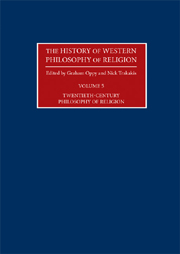Book contents
- Frontmatter
- Contents
- Editorial Introduction
- Contributors
- 1 Twentieth-Century Philosophy of Religion: An Introduction
- 2 William James
- 3 Henri Bergson
- 4 John Dewey
- 5 Alfred North Whitehead and Charles Hartshorne
- 6 Bertrand Russell
- 7 Max Scheler
- 8 Martin Buber
- 9 Jacques Maritain
- 10 Karl Jaspers
- 11 Paul Tillich
- 12 Karl Barth
- 13 Ludwig Wittgenstein
- 14 Martin Heidegger
- 15 Emmanuel Levinas
- 16 Simone Weil
- 17 A. J. Ayer
- 18 William P. Alston
- 19 John Hick
- 20 Mary Daly
- 21 Jacques Derrida
- 22 Alvin Plantinga
- 23 Richard Swinburne
- 24 Late-Twentieth-Century Atheism
- Chronology
- Bibliography
- Index
3 - Henri Bergson
- Frontmatter
- Contents
- Editorial Introduction
- Contributors
- 1 Twentieth-Century Philosophy of Religion: An Introduction
- 2 William James
- 3 Henri Bergson
- 4 John Dewey
- 5 Alfred North Whitehead and Charles Hartshorne
- 6 Bertrand Russell
- 7 Max Scheler
- 8 Martin Buber
- 9 Jacques Maritain
- 10 Karl Jaspers
- 11 Paul Tillich
- 12 Karl Barth
- 13 Ludwig Wittgenstein
- 14 Martin Heidegger
- 15 Emmanuel Levinas
- 16 Simone Weil
- 17 A. J. Ayer
- 18 William P. Alston
- 19 John Hick
- 20 Mary Daly
- 21 Jacques Derrida
- 22 Alvin Plantinga
- 23 Richard Swinburne
- 24 Late-Twentieth-Century Atheism
- Chronology
- Bibliography
- Index
Summary
That the ideas of Henri Bergson (1859–1941) were once associated with the French school of spiritualist philosophy (from Maine de Biran to Teilhard de Chardin); that Bergsonism was, for a time, both commended and rejected as an idealist and idealistic philosophy in reaction against the materialism of its day; that seemed to deify humanity as the highpoint of evolution (in the face of a century of increasing pessimism regarding the value of human being); and that it urged a concentration on a form of time (durée) that transcends space and matter: all this would appear to mark Bergson's thought as one belonging to a transcendental tradition, one with a religious bent at heart, and one with some secretive God residing at its centre. Bergson's embrace of Catholicism and by Catholic thinkers would add to this impression (in 1941 he made a deathbed announcement of his conversion from Judaism to Christianity, although always maintaining its secrecy in favour of a public stance of solidarity with the Jewish community under persecution); so too would the posthumous decline of his philosophical standing under the weight of constant attacks from the more obviously secular thought of Sartrean existentialism and phenomenology, Marxist materialism and Bachelardian epistemology.
- Type
- Chapter
- Information
- The History of Western Philosophy of Religion , pp. 27 - 38Publisher: Acumen PublishingPrint publication year: 2009

